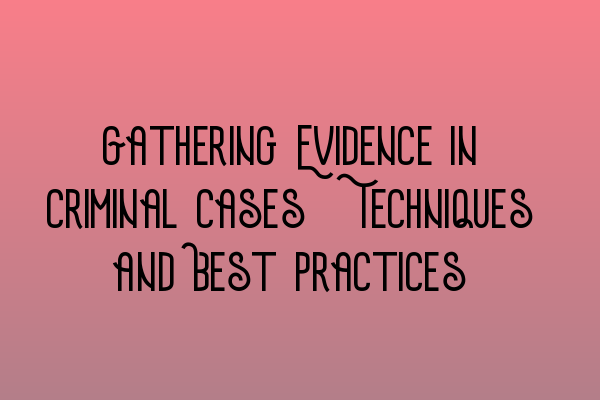Gathering Evidence in Criminal Cases: Techniques and Best Practices
Welcome to SQE Criminal Law & Practice UK! In this blog post, we will discuss the essential techniques and best practices for gathering evidence in criminal cases. As a solicitor, it is crucial to have a thorough understanding of the methods involved in collecting evidence to build a strong case. Let’s dive in!
The Importance of Gathering Evidence
Gathering evidence is the foundation of any successful criminal case. It helps establish the facts, prove guilt or innocence, and ensure a fair trial. With the right evidence, you can effectively present your client’s position and counter the prosecution’s arguments.
Now, let’s explore some key techniques and best practices for collecting evidence:
1. Conduct Thorough Interviews
One of the primary ways to gather evidence is through interviews. These interviews can be conducted with witnesses, victims, police officers, or experts in various fields. To make the most of these interviews, ensure you:
- Prepare a list of relevant questions
- Active listen and take detailed notes
- Ask open-ended questions to encourage detailed responses
By conducting thorough interviews, you can gather valuable testimonies to support your case.
2. Physical and Forensic Evidence
Physical and forensic evidence play a crucial role in criminal cases. This includes fingerprints, DNA samples, weapon analysis, surveillance footage, and more. It is essential to:
- Collect and preserve physical evidence in a secure manner
- Engage forensic experts to analyze the evidence
- Ensure proper chain of custody to maintain evidence integrity
This scientific evidence can provide compelling support for your case.
3. Digital Evidence
In the digital age, digital evidence has become increasingly important in criminal cases. This includes data from computers, smartphones, social media, and other electronic devices. To effectively gather digital evidence:
- Engage digital forensic experts
- Obtain necessary legal permissions or search warrants
- Preserve and analyze digital evidence following proper protocols
Given the prevalence of digital technologies, this type of evidence can be critical in today’s criminal investigations.
4. Documentary Evidence
Documentary evidence refers to any written or recorded material that can support your case. It includes police reports, medical records, financial documents, contracts, and more. To gather and utilize documentary evidence effectively:
- Identify the relevant documents for your case
- Ensure the documents are admissible in court
- Authenticate the documents to establish their credibility
Documentary evidence can provide a solid foundation for your arguments.
5. Collaboration and Expert Consultation
Collaborating with other professionals and consulting experts is crucial in gathering evidence. This can involve:
- Working closely with investigators and law enforcement agencies
- Engaging expert witnesses to provide specialized knowledge
- Seeking advice from senior solicitors and case consultants
By leveraging the expertise of others, you can strengthen your case and fill any knowledge gaps.
Conclusion
Gathering evidence is an integral part of criminal law practice. By following the techniques and best practices mentioned above, you can effectively collect evidence to build a strong case for your client. Remember, thorough interviews, physical and forensic evidence, digital evidence, documentary evidence, and collaboration are key to successful evidence gathering.
We hope this article has provided valuable insights into gathering evidence in criminal cases. If you would like to further enhance your legal knowledge, consider exploring our related articles:
- SQE 1 Practice Exam Questions
- SQE 1 Practice Mocks FLK1 FLK2
- SQE 2 Preparation Courses
- SQE 1 Preparation Courses
- SRA SQE Exam Dates
